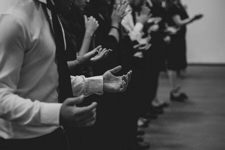Why Pray?
April 1, 2021 Growing up in a mostly secular family, I had very little exposure to prayer in my home. I have only vague memories of my grandmother on my mother’s side raising her hands over the lit candles of her Seder table and reciting the Hebrew blessings for Passover. My father, a preacher’s grandkid, fled his southern evangelical Christian upbringing with its fiery rhetoric of eternal damnation.
Growing up in a mostly secular family, I had very little exposure to prayer in my home. I have only vague memories of my grandmother on my mother’s side raising her hands over the lit candles of her Seder table and reciting the Hebrew blessings for Passover. My father, a preacher’s grandkid, fled his southern evangelical Christian upbringing with its fiery rhetoric of eternal damnation.
My own early relationship to prayer was, well, awkward. I was untaught and unversed in prayer. That made me different from my childhood peers, almost all of whom were raised in practicing and sometimes devout Catholic families. As they prepared for first communion, my friends shared the prayers they’d learned, the Our Father and the Hail Mary. They punctuated their reverent words with graceful hand motions—fingertips to head, heart, one shoulder, and the other.
I was intrigued… and envious. My friends seemed to know a wondrous, rhythmic language that was utterly unfamiliar to my lips. They had access to a world of rituals from which I was apart.
My feeling of awkwardness is best captured in a singular memory. I was six years old and sleeping over a friend’s for the first time. Missy’s parents had considerately prepared my favorite dinner. As soon as the steaming plates were set and everyone seated at the kitchen table, I eagerly tucked into my spaghetti. Missy gently nudged my arm with her elbow. Looking up, I beheld the family raising their hands to their heads as they began to pray. Meanwhile, I sat frozen and silent, my fork suspended in front of my face, saucy spaghetti strands dangling in the air… Awkward.
That awkwardness caused me to avoid prayer and religious life for a long time. Praying was simply something I had never learned to do, akin to riding a bike or playing an instrument. I would rather not expose my ineptitude. Yet, I couldn’t shake a longing to speak a language of reverence and to enter a world of ritual.
Unitarian Universalism opened a door to that world and extended lessons in that language. Our faith tradition has encouraged me to bring my awkwardness through the doors with me, to take it as a starting point for spiritual exploration, deepening, and growth.
Unitarian Universalism invited me to understand prayer not as a predetermined language or skill that I had failed to master, but rather as a means of spiritual self-expression that we are called to develop and practice over a lifetime. Unitarian Universalism encourages us to ask the “Why” and “How” and “What” of prayer, and to earnestly seek answers in dialogue with our friends on the journey. Our prayers may not all look the same, or sound the same, or invoke the same source. They may change with the seasons of our lives, and as our understanding evolves. And that’s ok.
Last fall, the Worthy Now prison ministry extended an invitation to our incarcerated members to explore the meaning, purpose, and practice of prayer in their lives by taking part in the “Spirit of Life” faith formation course.
Participants reflected on why they pray, and some composed their own prayers. Weaving together their shared insights and prayers, I offer this prayer in their honor:
Spirit of Life, Goddess of Reality,
Heavenly Mother, Heavenly Father,
Children, Air, Fire, Earth, Water,
Source of All,
We pray to remember the transcendent
in our daily lives.
We pray to connect with Nature and
the Divine.
We pray to become one with
the Universe.
We pray to confess without fear of
judgement.
We pray to give voice to the experiences
of injustice, pain, and suffering,
in and around us.
We pray that we may know we belong
to one another.We pray for comfort and nourishment;
for hope, love and joy,
for wisdom, courage, and balance;
for acceptance.
We pray for the strength to fight the
systems of oppression
that confine and separate us.
We pray for another chance to live
freely on the outside again.
We pray for health and survival.
We pray for liberationMay it be so. May we make it so.
Amen.
I invite you to explore your relationship to prayer. Why do (or don’t) you pray? How has your relationship to prayer changed over the course of your life? If prayer is part of your practice, to whom or what do you pray? For what do you pray? How do you pray? With whom do you pray? How do you believe your prayers impact the wider world
- A Farewell Note from Rev. Jennifer - June 1, 2021
- Why Pray? - April 1, 2021
- Remembering John - March 1, 2021
Quest Monthly Print Edition
Recent Issues
Latest Spiritual Reflection Posts
Weekly Newsletter
About
Quest for Meaning is a program of the Church of the Larger Fellowship (CLF).
As a Unitarian Universalist congregation with no geographical boundary, the CLF creates global spiritual community, rooted in profound love, which cultivates wonder, imagination, and the courage to act.
Contact
Church of the Larger Fellowship Unitarian Universalist (CLFUU)
24 Farnsworth Street
Boston MA 02210
